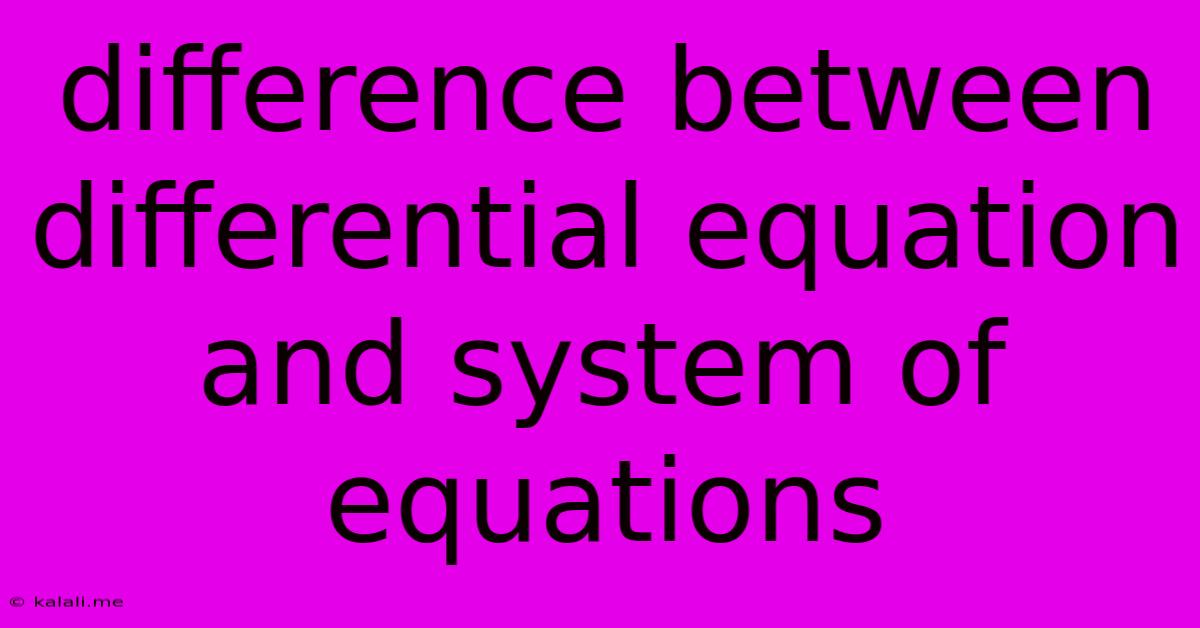Difference Between Differential Equation And System Of Equations
Kalali
Jun 07, 2025 · 3 min read

Table of Contents
Differential Equations vs. Systems of Equations: Unveiling the Key Differences
This article delves into the fundamental differences between differential equations and systems of equations, two crucial concepts in mathematics and various scientific disciplines. Understanding these distinctions is vital for anyone working with mathematical modeling, particularly in fields like physics, engineering, and economics. We will explore their definitions, applications, and the methods used to solve them.
What is a Differential Equation?
A differential equation is an equation that relates a function to its derivatives. In simpler terms, it describes how the rate of change of a quantity affects the quantity itself. These equations are powerful tools for modeling dynamic systems where change is a central feature. The order of a differential equation is determined by the highest order derivative present. For example, a first-order differential equation involves only the first derivative, while a second-order equation involves the second derivative.
Types of Differential Equations:
Differential equations come in various forms, categorized by their order, linearity, and the presence of partial derivatives. Key types include:
- Ordinary Differential Equations (ODEs): These involve functions of a single independent variable and their derivatives. They are commonly used to model processes that change over time.
- Partial Differential Equations (PDEs): These involve functions of multiple independent variables and their partial derivatives. They are frequently used to model phenomena that vary across space and time, such as heat diffusion or wave propagation.
- Linear vs. Non-linear: Linear differential equations exhibit a linear relationship between the function and its derivatives, while non-linear equations do not. Non-linear equations are often significantly more challenging to solve.
What is a System of Equations?
A system of equations is a collection of two or more equations that must be solved simultaneously. The goal is to find a solution (or solutions) that satisfies all equations in the system. These equations can involve various types of expressions, including linear, quadratic, or even transcendental functions.
Types of Systems of Equations:
Systems of equations can be categorized based on the types of equations they contain and the number of variables involved. Common types include:
- Linear Systems: All equations in the system are linear (first-order polynomials). These systems are relatively straightforward to solve using methods like Gaussian elimination or matrix inversion.
- Non-linear Systems: At least one equation in the system is non-linear. Solving non-linear systems can be significantly more complex and may require numerical methods.
- Systems with Different Numbers of Variables and Equations: The number of variables and equations can influence the solvability and number of solutions.
Key Differences Between Differential Equations and Systems of Equations:
The primary difference lies in the nature of the equations themselves:
| Feature | Differential Equation | System of Equations |
|---|---|---|
| Nature of Equations | Relates a function to its derivatives | Relates multiple variables through several equations |
| Variables | Involves independent and dependent variables | Involves multiple variables (dependent and/or independent) |
| Solutions | Typically a function (or family of functions) | Typically a set of values for each variable |
| Applications | Modeling dynamic systems, change over time | Modeling static relationships, equilibrium conditions |
| Solving Methods | Analytical methods (separation of variables, integrating factors), numerical methods (Euler's method, Runge-Kutta methods) | Elimination, substitution, matrix methods, numerical methods |
Connecting Differential Equations and Systems of Equations:
Interestingly, systems of differential equations are a common occurrence. These systems involve multiple differential equations, each representing the rate of change of a different variable, and how these rates depend on each other. Solving such systems often requires advanced techniques and computational tools.
In Conclusion:
While both differential equations and systems of equations are powerful tools for mathematical modeling, their applications and the methods used to solve them differ significantly. Differential equations describe dynamic processes involving change, while systems of equations address relationships between multiple variables. Understanding these differences is essential for effectively applying these mathematical concepts to a wide range of problems.
Latest Posts
Latest Posts
-
Can You Bake In Aluminum Pans
Jun 08, 2025
-
Substitute For Instant Mashed Potato Flakes
Jun 08, 2025
-
Dan Brown Books Made Into Movies
Jun 08, 2025
-
Replace Copper Water Line To Fridge
Jun 08, 2025
-
Support To Deal With Nasus Slow
Jun 08, 2025
Related Post
Thank you for visiting our website which covers about Difference Between Differential Equation And System Of Equations . We hope the information provided has been useful to you. Feel free to contact us if you have any questions or need further assistance. See you next time and don't miss to bookmark.